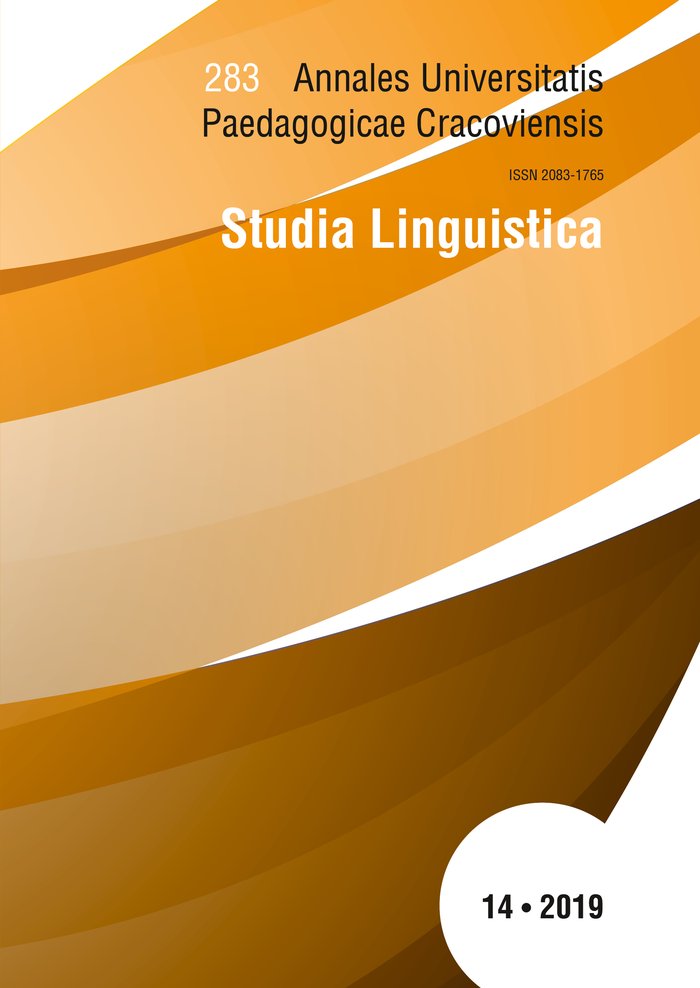On the trail of the dying dialectal words
Main Article Content
Abstract
The subject matter of the article is the problem of the dying dialectal words. The author of the article found such words, used only by elderly people, in the dictionary of M. Kucała Porównawczy słownik trzech wsi małopolskich (The comparative dictionary of three villages of Little Poland) (Kucała 1957) and compared them with the adequate material in some Polish dialectal dictionaries. The author noticed the occurrence of various types of such words.
Downloads
Article Details
Author, submitting a text to the editorial board of the journal “Annales Universitatis Paedagogicae Cracoviensis. Studia Linguistica", certifies that the content of the article has not been published so far and that the work does not violate in any way the copyright or related rights of other person, as well as other rights of third parties, and that no one's rights to the work (or any part thereof) have been missed. After signing the contract, the property rights to the published materials are transferred to the Scientific Publisher of the University of the National Education Commission, Krakow.
“Annales Universitatis Paedagogicae Cracoviensis. Studia Linguistica” is an open access journal, and all its content is made available free of charge to users and institutions under the Creative Commons CC-BY-NC-ND 4.0 license (attribution, non-commercial use, no derivative works). Under this license, the authors agree that their work may be lawfully reused for any purpose, except for commercial purposes, without the prior consent of the author or publisher. Everyone can read, download, copy, print, distribute and process these works, provided that the author's marking and the original publication place are correct. Published texts may not be used to create derivative works (e.g. to translate and publish in another language without the consent of the publisher). This is in line with the BOAI (Budapest Open Access Initiative) definition. "Studia Linguistica" does not charge for submitting or processing articles.
References
Hodorowicz S.A., 2013, Słownik dawnych i współczesnych wyrażeń górali Skalnego Podhala, Nowy Targ.
Google Scholar
Kąś J., 2011, Słownik gwary orawskiej, t. I A−O, t. II P−Ż, Kraków.
Google Scholar
Kąś J., 2015−2018, Ilustrowany leksykon gwary i kultury podhalańskiej, t. I A−B, t. II C−Do, Bukowina Tatrzańska–Nowy Sącz 2015, t. III Dó−Gr, Bukowina Tatrzańska 2016, t. IV Gu−Kol, Kraków 2017, t. V Koł−Mad, Nowy Sącz 2017, t. VI Maf−Nie, Nowy Sącz 2018.
Google Scholar
Kobylińska J., 2001, Słownik gwary gorczańskiej (zagórzańskiej), Kraków.
Google Scholar
Kucała M., 1957, Porównawczy słownik trzech wsi małopolskich, „Prace Językoznawcze PAN”, t. XI, Wrocław.
Google Scholar
Kucała M., 1960, O słownictwie ludzi wyzbywających się gwary, „Biuletyn Polskiego Towarzystwa Językoznawczego” XIX, s. 141−156. Przedruk w: M. Kucała, 2000, Polszczyzna dawna i współczesna. Studia i szkice, „Prace Instytutu Języka Polskiego” 112, s. 326−339.
Google Scholar
Niezabitowska A., 1960, Zmiany w słownictwie żywieckim na przestrzeni ostatnich 70 lat, „Zeszyty Naukowe Uniwersytetu Jagiellońskiego” LX, „Prace Językoznawcze”, z. 5, s. 355−364.
Google Scholar
Rzeszowski L., 1891, Spis wyrazów ludowych z okolic Żywca, „Sprawozdania Komisji Językowej Akademii Umiejętności w Krakowie” IV, s. 353−361.
Google Scholar
Sławski F., Słownik etymologiczny języka polskiego, t. I−V, A−ŁŻYWY, Kraków 1952−1982.
Google Scholar
Słownik języka polskiego, 1958−1969, t. I−X + t. XI Suplement, red. W. Doroszewski, Warszawa.
Google Scholar
Słownik polskich leksemów potocznych, 2001−2016, t. I−VII red. W. Lubaś, t. VIII−X red. W. Lubaś, K. Skowronek (A−PIR), Kraków 2001−2016.
Google Scholar
Wronicz J., 2006, Amatorskie słowniki gwarowe, „Prace Instytutu Języka Polskiego” (PAN), 127, „Studia Dialektologiczne” III, pod red. J. Okoniowej, Kraków 2006, s. 171−180.
Google Scholar
Zborowski J., 2009, Słownik gwary Zakopanego i okolic, opracowany i uzupełniony z materiałów Autora przez Zespół Instytutu Języka Polskiego Polskiej Akademii Nauk pod kierunkiem Joanny Okoniowej. Koncepcja i opracowanie naukowe: Joanna Okoniowa, Barbara Grabka, Renata Kucharzyk, Monika Buława, współpraca: Ewelina Grześkiewicz, Anna Kostecka-Sadowa, Emil Popławski, Maria Tokarz, Anna Tyrpa, Kinga Wenklar, Kazimierz Woźniak, Jadwiga Wronicz, Zakopane−Kraków.
Google Scholar
